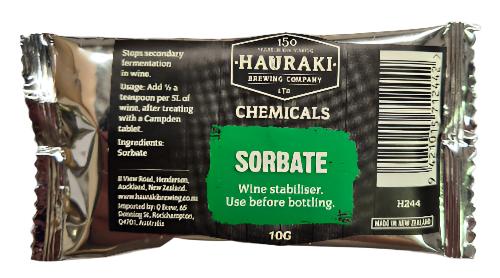HBC Sorbate (Wine Stabiliser) 10g
HBC Sorbate (Wine Stabiliser) 10g
Potassium Sorbate is commonly called Wine Stabiliser. When dissolved in water, potassium sorbate (CH3CH=CHCH=CHCOOK) breaks into sorbic acid and ionic potassium. It is sorbic acid that has selective anti-fungal, anti-microbial properties. It inhibits yeast very effectively—it does not kill yeast cells, it only prevents their growth and activity. Therefore, before sorbate is added, a wine should be racked clear in order to reduce the number of yeast cells. Sorbic acid itself is soluble in alcohol but virtually insoluble in water. However, potassium sorbate, a salt of sorbic acid, is very soluble in water and virtually insoluble in alcohol. This is why sorbate is used to carry the sorbic acid into the wine. Sorbic acid is very stable in wine. It does not combine with other elements and thereby lose its potency. So there is no point in adding any more than necessary.
Sorbic acid is not effective against many bacteria. It MUST be used in conjunction with SO2 (Potassium Metabisulphite OR Campden Tablets) to control acetic acid and malolactic bacteria. The major danger in adding sorbate to wine is active malolactic bacteria. They can metabolize sorbic acid and produce a disastrous bi-product called hexanedienol that has a strong geranium-like smell. This will ruin the wine, and there is no way to recover from this fault. Therefore, make sure ML bacteria are under control (via Lyzozyme, pH, and SO2) before you add sorbate. Sorbate, like SO2, is more effective at lower pH. Therefore wines like Riesling, which tend to have a lower pH, will not need as much sorbate as social wines that have been made from other varieties of ripe grapes. Less sorbate is needed with high alcohol wines, because alcohol itself inhibits yeast activity. The amount of sugar in the wine has no effect on the amount of sorbate needed. The only concern (besides pH and alcohol) is the initial population of yeast cells, which should be below 100 per milliliter.
Home winemakers usually have no means to assess this, so they simply rack a wine as clear as possible before adding sorbate.
Peynaud's Recommendations for Sorbate Additions to Sweet Wines Alcohol%Sorbic Acidmg/LSorbateg/L 10% 150 0.20 11% 125 0.17 12% 100 0.13 13% 75 0.10 14% 50 0.07 Note: these recommendations presume a pH < 3.5, good clarification, and adequate SO2. NOTE: If you don't have an accurate scale, 1 tsp of potassium sorbate weights about 2.9 grams.
17 in stock
View full details

